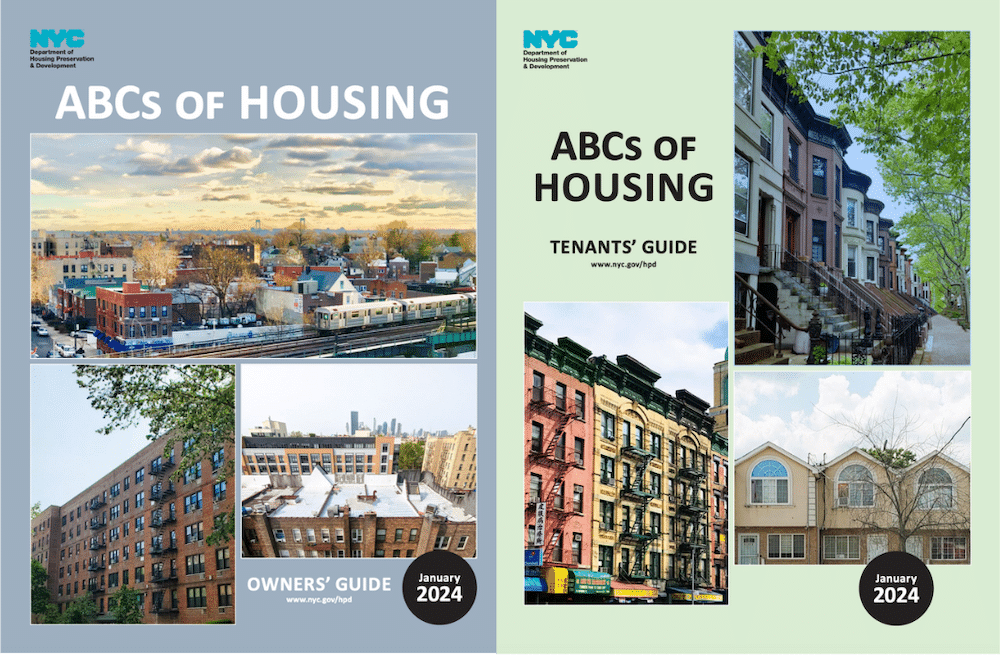HPD Publishes 2024 Edition of The ABCs of Housing

New York City’s Department of Housing Preservation & Development (HPD) recently released the 2024 version of its housing information guide, The ABCs of Housing. The biggest change: There are now two versions, one for building owners and one for tenants. Both versions are available in 11 languages.
Building owners do not have to provide copies of the guide for tenants, but they must post a notice of the guide’s availability in a public area of the building. Owners can download a sample notice from the HPD website.
Here are some highlights from the 2024 edition.
Landlords: Property Registration Requirements
Owners of residential properties with three or more residential units must register the units annually with HPD. Property registration is also required for one- or two-family homes if neither the owner nor the owner’s immediate family resides at the property.
If the building is rent stabilized, the owner must register the rents annually with NYS Homes and Community Renewal.
Landlords: What’s New in the Guide?
Because legislation and other government activity affect the rules building owners must follow, owners should always have the latest guide handy. Some of the changes and updates in the 2024 guide include the following:
Self-closing doors. To prevent the spread of fire and smoke, doors in apartments and public hallways must be equipped with a device that ensures that an opened door will return to a closed position and self-latch. Inspectors will check self-closing doors of every apartment they inspect, even if no complaint has been filed, and confirm that self-closing doors in common areas are operational (more information on page 5 of the guide).
Lead-based paint. Lead-based paint hazards are presumed to exist if:
- the building was built before 1960, and
- the building has three or more apartments or a rented unit in a one- or two-family home, and
- a child under six lives in the unit or spends 10 or more hours a week there.
Building owners must follow proactive requirements to keep tenants safe from lead-based paint hazards. In addition, owners must identify and correct such hazards in apartments and common areas of properties with young children, using certified remediation professionals and safe work practices (pages 6-7).
New deadlines, required notices and updated penalties and correction procedures for deficiencies (pages 11-14).
Enhanced enforcement programs. The new edition includes information about HPD enhanced enforcement programs for buildings that fail to address deficient conditions in a timely manner and/or allow HPD violations to accumulate. Selection for such programs may result in emergency repair charges, assessments, relocation liens and civil penalties (see page 14).
Resources for owners, such as low-interest loans, tax exemptions and foreclosure regulations (page 19).
Important information on LL97 (Greenhouse Gas Emissions Reporting and Reduction), which applies to most buildings that exceed 25,000 square feet (page 20).
Tenant Responsibilities
Owners aren’t the only ones who must follow certain laws and meet important standards; tenants do as well. Tenants have responsibilities to their landlords and other tenants, including the following:
- Tenants may not damage the building, intentionally or through neglect.
- Tenants are responsible for the actions of their guests.
- Tenants must respond to annual owner inquiries related to window guards and lead-based paint.
- Tenants must maintain smoke and carbon monoxide detectors.
- Tenants must obey the legal terms of leases, pay rent on time, honor the rights of other tenants, and provide access for repairs.
- Tenants must allow the owner, their agent, or their employee(s) to enter the tenant’s apartment or other space under the tenant’s control to inspect, make repairs or make improvements as required by the Housing Maintenance Code (HMC) or other laws. (Owners must notify the tenant in advance in writing before entering a unit except in urgent or emergency conditions, and other restrictions apply.)
If you have any questions about your building insurance, call our office at 877-576-5200 or request a free, no-obligation policy review.
If you have any questions about your building insurance, call our office at 877-576-5200 or request a free, no-obligation policy review.
